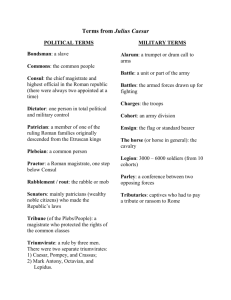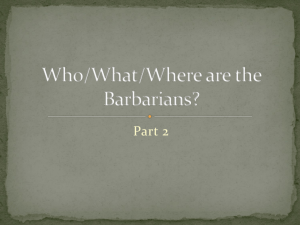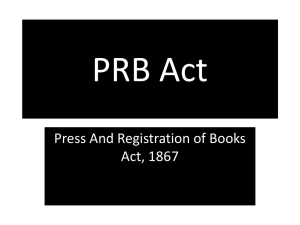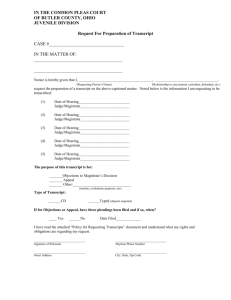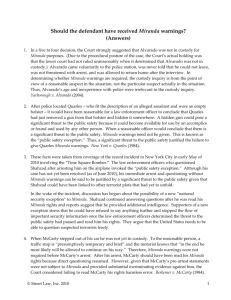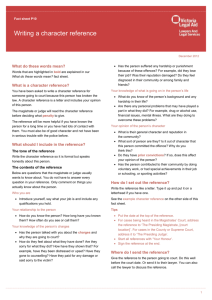Certifications and Determinate Sentencing in Texas
advertisement
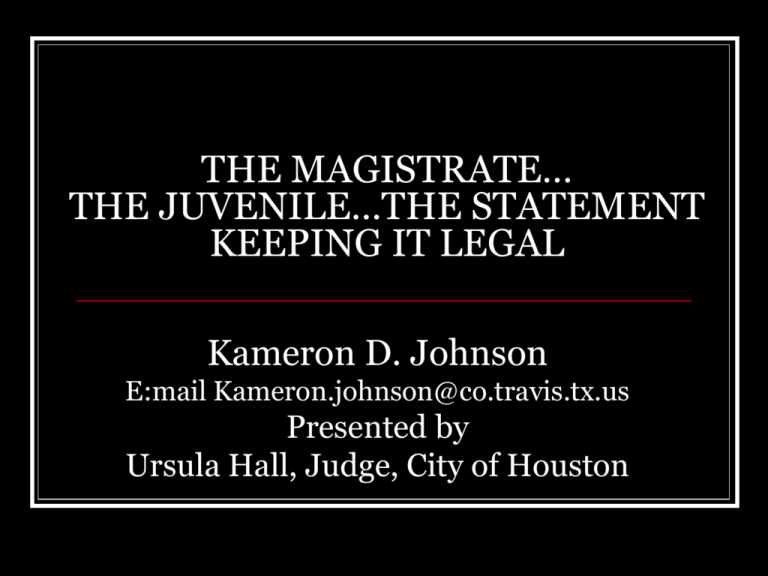
THE MAGISTRATE… THE JUVENILE…THE STATEMENT KEEPING IT LEGAL Kameron D. Johnson E:mail Kameron.johnson@co.travis.tx.us Presented by Ursula Hall, Judge, City of Houston 3:00 A.M. Who are Magistrates? Sources of Law U.S. Constitution Texas Constitution Code of C.C.P. Penal Code Texas Family Code TFC Section 51.095 Similar to art. 38.22 Code of Criminal Procedure. Major Difference: §51.095 requires a magistrate give the warnings and not a peace officer. MUST BE A CHILD STATEMENTS §51.095(a)(1) Family Code. Similar to art. 38.22 Code of Criminal Procedure. Major Difference: §51.095 requires a magistrate give the warnings and not a peace officer. Fare v. Michael C., 442 U.S. 707 Totality of the Circumstances: Age Experience Education Capacity to Understand E.A.W., 547 S.W.2d 63 11-year-old detained midnight – 9 a.m. No access to parent But §51.095 compliance E.A.W. 574 S.W.2d 63 RULING: Involuntary because of absence of presence and guidance of parent or friendly adult and the child’s immaturity CUSTODY What is it? V.M.D. 974 S.W.2d 332 “Reasonable Person” believes the restraint is tantamount with a formal arrest. If free to leave after questioning, child was never in custody. L.M. 993 S.W.2d 332 Established the “Reasonable Juvenile” standard Taken against will No experience with the system No contact with parents Told not free to leave Child of same age would think couldn’t leave CUSTODY California v. Hodari D. 499 U.S. 621 Submission to show of officer’s authority or use of force. Johnson v. State 912 S.W.2d 227 “For purposes of constitutional analysis, both investigative detentions and arrests are seizures.” J.D.B. v. North Carolina 564 U.S. __, 113 S. Ct. 2394 (2011) 13-year-old interrogated at school by cop and school administrator in closed room, and allowed to leave afterward. J.D.B. v. North Carolina Holding: Court must consider a child’s age when determining if child was in custody, when age of child is known to the officer, or objectively apparent to a reasonable officer. Admissible Custodial Statements 1) Res Gestae 2) Establishes Guilty and Leads to Secreted Evidence 3) Open Court Statements Res Gestae Statements Not a product of questioning. Beware of the functional equivalent. Child in custody or not. However, was it voluntary? Totality of Circumstances Roquemore, 60 S.W.3d 862 Res Gestae Mirandizing a kid is NOT interrogation. Kid was placed in police car and read his Miranda rights. Kid said he wanted to cooperate. Then he made incriminating statement. Held: Not product of interrogation. 2) Secreted Evidence Must establish guilt and lead to secreted evidence. Evidence must be unknown to cops. Meza 543 S.W.2d 189 Kid must at a minimum be Mirandized. R.L.S. 575 S.W.2d 665 Secreted Evidence Officers knew about the evidence being sought, therefore was not considered “secreted.” Respondent’s statement leading to the evidence was ruled inadmissible. 3) Open Court Statements Statements made in open court are admissible. Except statements made at a detention hearing. §54.01(g) Family Code WRITTEN STATEMENTS 1) Custody 4) Kid waives rights 2) Taken to Magistrate 5) Kid makes statement in cop’s presence 3) Receive Miranda warnings 6) Magistrate certifies the statement outside cop’s presence Receive Miranda Warnings Child is taken to a magistrate (Herring v. State, Tex.App.Texarkana, Feb. 2, 2012 says cop can be present.) Magistrate must inform child of their right to: Silence Terminate Statement Receive Miranda Warnings Child has the right to have an attorney present Receive Miranda Warnings Child has right to have an attorney appointed if he can’t afford one. Receive Miranda Warnings Kid must waive his rights knowingly, intelligently and voluntarily. Sticking point here is the intelligently element Receive Miranda Warnings Child makes the statement in the presence of the officer, with his assistance Receive Miranda Warnings Child is brought back before the magistrate, without cop, and judge certifies that child made statement knowingly, intelligently and voluntarily Taken to Magistrate Child must be taken back to the magistrate, outside the presence of the officer. If safety is an issue, judge can have bailiff present. If no bailiff, cop can be present, BUT NO WEAPONS ALLOWED ORAL STATEMENTS 1) Custody 2) Magistrate gives warnings 3) Rights are waived 4) Waiver of rights must be recorded 5) Statement to the cop must be recorded 6) Defense counsel must get copy of tape 20 days before trial Magistrate Certification §51.095(a)(5) allows the judge to review the recording with the child to ensure it was voluntarily given. However, it’s at the judge’s discretion and need not be complied with. Kind of a nullity really. Invoking Rights H.V., 179 S.W.3d 746 “I want to call my mom. I want her to call attorney. I’m only 16.” Holding: Unequivocal request for an attorney. Totality of Circumstances, inexperience. NOTE: Not just request for mom, but for her to get an attorney. Invoking Rights R.D., 627 S.W.2d 803 Kid asked to speak with mom. No phone, aunt was contacted. Kid nevertheless made written statement. Holding: no invocation of counsel, no evidence mom was an attorney. VOLUNTARINESS OF STATEMENT Whether the statement is custodial or noncustodial, it must be made voluntarily Kameron D. Johnson Travis County Juvenile Public Defender 2201 Post Road, Suite 201 P.O. Box 1748 Austin, Texas 78767 Office 512.854.4128 Facsimile 512.854.4148 E: Mail: kameron.johnson@co.travis.tx.us
